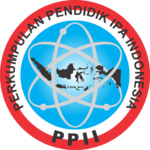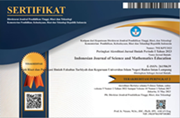How Does Problem-solving Method Affect Students’ Self-confidence and Mathematical Understanding?
Abstract
Keywords
Full Text:
PDFReferences
M. S. Hannula, H. Maijala, and E. Pehkonen, “Development of understanding and self-confidence in mathematics; Grades 5-8,” Proc. 28th Conf. Int. Gr. Psychol. Math. Educ., vol. 3, pp. 17–24, 2004.
J. Santrock, Educational Psychology, vol. 369, no. 1. 2013.
S. Nurdini, “Self Confidence Melalui Model Realistic Mathematics Education Dan Model Problem,” pp. 1–20.
A. Martyanti, “P – 3 Membangun Self-Cofidence Siswa Dalam Pembelajaran Matematika,” Penguatan Peran Mat. dan Pendidik. Mat. untuk Indones., no. November, pp. 978–979, 2013.
Wardani, “Pengaruh metode Problem Solving terhadap Kepercayaan Diri Siswa dalam Pembelajaran Matematika di MTS Nurul Ilmi Ranggagata tahun 2016/2017,” 2017.
E. Surya, “Pengaruh pendekatan problem solving terhadap kemampuan komunikasi matematis dan self confidence siswa di sma padangsidimpuan,” no. May, pp. 1–13, 2018.
N. N. Andrayani, “Pengaruh Strategi Problem Solving Menurut Wankat dan Oreovicz Terhadap Kemampuan Pemahaman Konsep Matematis dan Self-Regulaed Siswa,” EduHumaniora | J. Pendidik. Dasar Kampus Cibiru, vol. 7, no. 2, p. 173, 2016, doi: 10.17509/eh.v7i2.2708.
A. Edwards and A. Alcock, “Using rasch analysis to identify uncharacteristic responses to undergraduate assessments,” Teach. Math. its Appl., vol. 29, no. 4, pp. 165–175, 2010, doi: 10.1093/teamat/hrq008.
J. M. Linacre and B. D. Wright, A User’s Guide to B I G S T E P S: Rasch-Model Computer Program. 2006.
W. Hadi and A. Faradillah, “The Algebraic Thinking Process in Solving Hots Questions Reviewed from Student Achievement Motivation,” J. Chem. Inf. Model., vol. 53, no. 9, pp. 1689–1699, 2019, doi: 10.1017/CBO9781107415324.004.
P. Sari, “Pemahaman Konsep Matematika Siswa Pada Materi Besar Sudut Melalui Pendekatan Pmri,” J. Gantang, vol. II, no. 1, pp. 41–51, 2017.
A. Rojak, “Analisis pemahaman konsep pada materi perbandingan siswa smp,” 2017.
G. T. Paramitha, “Tingkat Percaya Diri Peserta Didik,” J. Chem. Inf. Model., vol. 53, no. 9, pp. 1689–1699, 2013, doi: 10.1017/CBO9781107415324.004.
H. Sutrisno and I. Kharisudin, “Problem Solving Ability with Mathematical Modeling Strategy in Term of Mathematics Self-Efficacy on Generative Learning Model,” Unnes J. Math. Educ., vol. 9, no. 1, pp. 43–52, 2020, doi: 10.15294/ujme.v9i1.35674.
H. D. Putra, H. Setiawan, D. Nurdianti, I. Retta, and A. Desi, “Kemampuan Pemahaman Matematis Siswa Smp Di Bandung Barat,” J. Penelit. dan Pembelajaran Mat., vol. 11, no. 1, 2018, doi: 10.30870/jppm.v11i1.2981.
T. Sri and N. Asih, “Analisis Kemampuan Pemahaman Konsep Matematika Ditinjau dari Rasa Ingin Tahu Siswa pada Model Concept Attainment,” Unnes J. Math. Educ. Res., vol. 6, no. 2, pp. 217–224, 2017.
M. Hamzah and N. Q. Mahmudah, “Pengaruh Aktivitas Belajar Terhadap Pemahaman Konsep Matematika Siswa Di Mts.Salafiyah Kota Cirebon,” pp. 1–13, 2010.
M. Novriani and E. Surya, “Analysis of student difficulties in mathematics problem solving ability at MTs SWASTA IRA Medan,” Int. J. Sci. Basic Appl. Res., vol. 33, no. 03, pp. 1–14, 2017.
K. G. Wulandari Annisa, nurcahya Ali, “Hubungan Antara Self Confidence Dengan Kemampuan Berpikir,” vol. 1, no. April, pp. 799–806, 2018, doi: 10.22437/edumatica.v8i01.4623.
A. Islami and N. Rusliah, “Pengaruh Self Confidence Terhadap Pemahaman Konsep Matematis Siswa Sekolah Menengah Pertama,” vol. 3, no. 1, pp. 187–193, 2019.
R. E. Simamora, S. Saragih, and H. Hasratuddin, “Improving Students’ Mathematical Problem Solving Ability and Self-Efficacy through Guided Discovery Learning in Local Culture Context,” Int. Electron. J. Math. Educ., vol. 14, no. 1, pp. 61–72, 2018, doi: 10.12973/iejme/3966.
R. Royston and R. Reiter-Palmon, “Creative self-efficacy as mediator between creative mindsets and creative problem-solving,” J. Creat. Behav., vol. 53, no. 4, pp. 472–481, 2019, doi: 10.1002/jocb.226.
S. A. Peranginangin, S. Saragih, and P. Siagian, “Development of Learning Materials through PBL with Karo Culture Context to Improve Students’ Problem Solving Ability and Self-Efficacy,” Int. Electron. J. Math. Educ., vol. 14, no. 2, pp. 265–274, 2019, doi: 10.29333/iejme/5713.
A. Lukum, E. Mohamad, M. S. Tamalu, K. Sukamto, and Y. Paramata, “Effect of problem solving learning models on self-confidence and student learning outcomes on topics of reduction-oxidation,” J. Phys. Conf. Ser., vol. 1317, no. 1, 2019, doi: 10.1088/1742-6596/1317/1/012152.
I. M. A. Purwadi, I. G. P. Sudiarta, and I. N. Suparta, “The effect of concrete-pictorial-abstract strategy toward students’ mathematical conceptual understanding and mathematical representation on fractions,” Int. J. Instr., vol. 12, no. 1, pp. 1113–1126, 2019, doi: 10.29333/iji.2019.12171a.
P. Y. A. Dewi and K. H. Primayana, “Effect of Learning Module with Setting Contextual Teaching and Learning to Increase the Understanding of Concepts,” Int. J. Educ. Learn., vol. 1, no. 1, pp. 19–26, 2019, doi: 10.31763/ijele.v1i1.26.
D. Herawaty and W. Widada, “The Influence of Contextual Learning Models and the Cognitive Conflict to Understand Mathematical Concepts and Problems Solving Abilities,” vol. 218, no. ICoMSE 2017, pp. 96–102, 2018, doi: 10.2991/icomse-17.2018.17.
DOI: http://dx.doi.org/10.24042/ijsme.v3i2.6640
Refbacks
- There are currently no refbacks.
Copyright (c) 2020 Unit Riset dan Publikasi Ilmiah FTK UIN Raden Intan Lampung

This work is licensed under a Creative Commons Attribution-ShareAlike 4.0 International License.

Indonesian Journal of Science and Mathematics Education is licensed under a Creative Commons Attribution-ShareAlike 4.0 International License.



